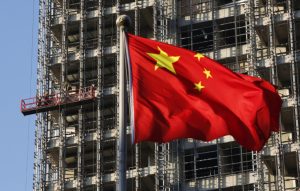Microsoft’s AI Projects in China: Innovation or Complicity? By Fred Wilson, an AI researcher and consultant with over 10 years of experience in the field. Artificial intelligence (AI) is one of the most powerful and transformative technologies of our time. It has the potential to improve lives, solve problems, and create new opportunities across various
Microsoft’s AI Projects in China: Innovation or Complicity?
By Fred Wilson, an AI researcher and consultant with over 10 years of experience in the field.
Artificial intelligence (AI) is one of the most powerful and transformative technologies of our time. It has the potential to improve lives, solve problems, and create new opportunities across various domains and industries. However, it also raises complex and challenging questions about its ethical, social, and geopolitical implications.
One of the most controversial issues in the AI landscape is the role of China, which has emerged as a global leader and competitor in AI development and deployment. China has ambitious plans to become the world leader in AI by 2030, and has invested heavily in AI research, education, and infrastructure. China also has a large and growing market for AI applications, especially in areas such as e-commerce, health care, education, and security.
However, China’s AI ambitions have also sparked concerns and criticisms from various stakeholders, especially in the United States, which views China as a strategic rival and a potential threat. Some of the main points of contention include:
- China’s lack of transparency and accountability in its AI governance and regulation, which may enable unethical and harmful uses of AI, such as mass surveillance, censorship, and social control.
- China’s alleged theft and misuse of intellectual property and data from foreign sources, which may undermine the innovation and competitiveness of other countries and companies.
- China’s military and geopolitical aspirations, which may leverage AI to gain an advantage and challenge the global order and stability.
In this context, one of the most prominent and controversial actors in the AI field is Microsoft, the American technology giant and one of the world’s leading AI companies. Microsoft has been actively involved in AI research and innovation in China, collaborating with various Chinese institutions, including universities, companies, and even the military.
Microsoft claims that its AI projects in China are driven by its mission to empower every person and organization on the planet to achieve more, and that it adheres to the highest standards of ethics and responsibility in its AI practices. Microsoft also argues that its AI collaborations in China are beneficial for both countries and the world, as they foster mutual understanding, exchange, and cooperation, and advance the state of the art in AI.
However, some critics disagree with Microsoft’s stance, and accuse it of being complicit in China’s AI agenda, which may pose ethical and security risks for the United States and the world. Some of the main arguments against Microsoft’s AI projects in China include:
- Microsoft is enabling and legitimizing China’s authoritarian and oppressive regime, which may use Microsoft’s AI technology and expertise to enhance its surveillance and control over its citizens and dissidents.
- Microsoft is compromising and endangering its own values and interests, as well as those of its customers and partners, by exposing its AI assets and data to potential theft and sabotage by Chinese actors.
- Microsoft is undermining and weakening the United States’ leadership and influence in AI, by giving China an edge and a foothold in the AI field, and by eroding the trust and confidence of its allies and partners.

Image by: https://blogs.microsoft.com/
What are Microsoft’s AI projects in China?
Microsoft has been operating in China since 1992, and has established a strong presence and reputation in the country. Microsoft has several offices, research centers, and innovation hubs in China, employing thousands of people and serving millions of customers. Microsoft also has a wide network of partnerships and collaborations with various Chinese institutions, including government agencies, academic institutions, and private companies.
One of the main areas of Microsoft’s engagement in China is AI, which is one of the company’s core strategic priorities and competencies. Microsoft has been conducting and supporting AI research and innovation in China for over two decades, and has contributed to the development and advancement of the AI field in China and the world.
Some of the notable examples of Microsoft’s AI projects in China include:
- Microsoft Research Asia (MSRA), which is Microsoft’s largest and most influential research center outside the United States, and one of the world’s top AI research institutions. MSRA was founded in 1998 in Beijing, and has since produced hundreds of publications, patents, and products in various AI domains, such as computer vision, natural language processing, speech recognition, machine learning, and cloud computing. MSRA also collaborates with over 200 universities and research institutes in China and the world, and has trained and nurtured thousands of AI researchers and engineers, many of whom have become leaders and pioneers in the AI field.
- Microsoft AI and Research Institute (MSARI), which is a joint venture between Microsoft and the Chinese Academy of Sciences (CAS), the national scientific academy of China. MSARI was established in 2017 in Beijing, and aims to conduct cutting-edge AI research and innovation, focusing on areas such as cognitive computing, human-computer interaction, and intelligent cloud. MSARI also seeks to promote the application and dissemination of AI in various sectors and scenarios, such as health care, education, and urban management.
- Microsoft AI Innovation Center (MSAIC), which is a platform for Microsoft to collaborate with local governments, enterprises, and universities in China, to foster AI innovation and entrepreneurship. MSAIC was launched in 2018 in Shanghai, and has since expanded to other cities, such as Guangzhou, Chengdu, and Nanjing. MSAIC provides various resources and services, such as AI training, mentoring, incubation, and funding, to support and empower AI startups and talent in China.
- Microsoft AI for Earth, which is a global initiative by Microsoft to use AI to address environmental challenges, such as climate change, biodiversity, and water. Microsoft AI for Earth was launched in 2017, and has since supported over 800 projects in over 90 countries, providing access to AI tools, data, and grants. In China, Microsoft AI for Earth has partnered with several institutions, such as the Institute of Botany of CAS, the Chinese Academy of Forestry, and the World Wildlife Fund, to apply AI to various environmental issues, such as forest conservation, wildlife protection, and air quality monitoring.

Image by: https://d. ib times.com
What are the benefits of Microsoft’s AI projects in China?
Microsoft maintains that its AI projects in China are beneficial for both China and the world, as they advance the scientific and technological progress of AI, and enable its positive and responsible use for the common good. Microsoft also asserts that its AI projects in China are consistent with its mission, values, and principles, and that it follows the highest standards of ethics and responsibility in its AI practices.
Some of the benefits that Microsoft claims its AI projects in China bring include:
- Enhancing the quality and impact of AI research and innovation, by leveraging the complementary strengths and resources of both countries, and by fostering cross-cultural and cross-disciplinary collaboration and exchange among AI researchers and innovators.
- Empowering and improving the lives and livelihoods of people and organizations in China and the world, by providing access to AI solutions and services that can address various challenges and opportunities, such as health, education, productivity, and entertainment.
- Promoting and supporting the development and adoption of ethical and trustworthy AI, by engaging and influencing various stakeholders, such as policymakers, regulators, educators, and consumers, and by sharing and applying best practices and guidelines for AI governance and regulation.
- Building and strengthening the mutual understanding, trust, and cooperation between China and the world, by creating and maintaining constructive and respectful dialogue and partnership, and by contributing to the global AI community and ecosystem.
What are the risks and criticisms of Microsoft’s AI projects in China?
Microsoft’s AI projects in China have also faced risks and criticisms from various stakeholders, especially in the United States, which views China as a strategic rival and a potential threat. Some of the risks and criticisms that Microsoft’s AI projects in China entail include:
- Enabling and legitimizing China’s authoritarian and oppressive regime, which may use Microsoft’s AI technology and expertise to enhance its surveillance and control over its citizens and dissidents. For instance, Microsoft has been accused of collaborating with a Chinese military-run university on AI research that could be used for surveillance and censorship. Microsoft has also been criticized for complying with China’s strict internet regulations, which may limit the freedom and privacy of its users and customers in China.
- Compromising and endangering its own values and interests, as well as those of its customers and partners, by exposing its AI assets and data to potential theft and sabotage by Chinese actors. For example, Microsoft has been targeted by several cyberattacks from China, which may have compromised its intellectual property and customer data. Microsoft has also been challenged by the U.S. government over its bid to acquire TikTok, a popular Chinese-owned social media app, which may pose national security and data privacy risks.
- Undermining and weakening the United States’ leadership and influence in AI, by giving China an edge and a foothold in the AI field, and by eroding the trust and confidence of its allies and partners. For instance, Microsoft has been questioned by some U.S. lawmakers and experts over its AI projects in China, which may violate U.S. export controls and sanctions, and may harm U.S. competitiveness and security. Microsoft has also been urged by some human rights and civil society groups to stop or limit its AI activities in China, which may conflict with its ethical and social responsibilities.
How can Microsoft balance its AI projects in China?
Microsoft faces a complex and delicate dilemma in balancing its AI projects in China, as it has to
- econcile its business and innovation goals with its ethical and social values and responsibilities
- navigate the complex and dynamic political and regulatory environment in both countries and the world
- manage the expectations and perceptions of its various stakeholders, such as customers, partners, employees, regulators, and the public
There is no easy or definitive answer to this dilemma, as Microsoft has to weigh the costs and benefits of its AI projects in China, and balance the trade-offs and risks involved. However, some possible steps that Microsoft can take to address this challenge include:
- Developing and implementing a clear and consistent AI strategy and policy for its operations and activities in China, which aligns with its mission, vision, and principles, and reflects its commitment to ethical and trustworthy AI.
- Engaging and communicating with its stakeholders, both internally and externally, to explain and justify its AI projects in China, and to solicit and incorporate their feedback and concerns.
- Collaborating and cooperating with other actors, such as governments, international organizations, industry associations, and civil society groups, to establish and promote common standards and norms for AI governance and regulation, and to address and resolve potential conflicts and disputes.
- Monitoring and evaluating the impact and outcomes of its AI projects in China, and adjusting and improving its AI practices and performance accordingly, to ensure that its AI projects in China are beneficial and responsible for both China and the world.

Image by rawpixel.com on Freepik
Conclusion
Microsoft’s AI projects in China are a complex and controversial issue, which involve various opportunities and challenges, benefits and risks, and trade-offs and dilemmas. Microsoft has to balance its AI projects in China with its ethical and social values and responsibilities, and with its business and innovation goals and interests. Microsoft also has to navigate the complex and dynamic political and regulatory environment in both countries and the world, and manage the expectations and perceptions of its various stakeholders. Microsoft can take some steps to address this challenge, such as developing and implementing a clear and consistent AI strategy and policy, engaging and communicating with its stakeholders, collaborating and cooperating with other actors, and monitoring and evaluating the impact and outcomes of its AI projects in China. By doing so, Microsoft can hope to achieve its mission of empowering every person and organization on the planet to achieve more, and to contribute to the advancement and well-being of humanity through AI.

















Leave a Comment
Your email address will not be published. Required fields are marked with *